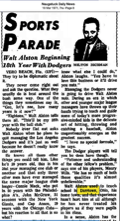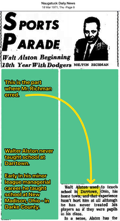
WALTER WHO?
What are the skills that a successful baseball manager must have? I suspect that there are many possible answers to that question, perhaps as many as those answering the question. No doubt each of us posting on LADT have different preferences or expectations. Some are happy with Dave Roberts, some not so pleased, some neutral. Perhaps each of us has a manager in mind that we think is or has been a good manager. Perhaps we assign a rating by a win-loss record or by post-season success.
I expect there are job descriptions for managers but they would include the duties the manager must perform. They cannot include the intangibles that make a manager a good manager but those personal characteristics that we admire are often uncovered by general managers in their quest to find a manager.
Perhaps those characteristics are uncovered in an interview or were witnessed when the prospective manager was a player.
The manager must work with the roster with which he is provided and working miracles is a rarity. Winning percentage does become significant when a manager has inherited a team that on paper ranks well down on the power rankings.
So, who is your guy? Tommy Lasorda with his emotional style of managing, “bleeding Dodger Blue”, “the big Dodger in the sky”, his rant after Dave Kingman hit three home runs against the Dodgers on May 14, 1978, starting Dave Goltz and his 4.38 ERA in the winner take all game with Houston in 1980 with rookie Fernando sitting on the bench. Don’t get me wrong, I am a huge Tommy Lasorda fan and I loved his emotion in and for the game. That emotion and his human side as a motivator was significant in the 1988 WS.
I liked Bill Russell. I thought of him as a lifetime Dodger, like Tommy, but with a cool and collected side. In late June 1996, Tommy suffered a mild heart attack and Russell became acting manager on June 25. The Dodger front office decided to make Russell’s appointment permanent on making him only the third man to manage the Dodgers in 43 years. I envisioned him on another long managerial run. He finished the 1996 season, compiling a record of 49–37 and bringing the Dodgers home in second place, earning the NL wild-card spot in the playoffs before being swept in three games by the Atlanta Braves in the Division Series. In 1997 he directed the Dodgers to an 88-74 mark and another runner-up finish in the NL West. When the 1998 club stumbled out of the blocks to a 36–38 start he was fired on June 21 as a precursor to News Corporation taking over the team. We all remember that. Bill Russell had a 30-year association with the Dodgers. His final managing record was 173–149 for a .537 winning percentage. A small sample but better than Joe Torre, Davey Johnson, Grady Little, the venerable Wilbur Robinson, Tommy Lasorda (.526). And yes, we do have to determine if winning percentage is the measure of a manager because of the countless variables involved in even one baseball season.
For me, Jim Tracy had one of my favorite Dodger moments. In 2004 after the Cardinals’ clinching victory in Game 4, the Dodgers and Cardinals came onto the field and shook hands as they do following the wining game in a playoff series in hockey. Tracy led his team onto the field, perhaps at the invitation of Tony LaRussa, but he did it. It is beyond me why a team that has lost in baseball in a final game slinks off the field and down into the locker room. Good for Jim Tracy.
“It was a class act,” said Cardinals pitching coach Dave Duncan. “Tracy led the way.”
Said an appreciative La Russa: “I know it had to be much more difficult for them to come out of the dugout and meet us halfway. It was impressive.”
I must admit I have run a bit off course. Back to, “Walter Who?” He, of course, is HOF manager Walter Alston.
Alston was born on December 1, 1911, in Venice, Ohio, a few miles northwest of Cincinnati. He was raised on a farm in his formative years and that is perhaps why he might have been mistaken for a farmer on the baseball field and in public meeting the press. He was hard-working, well prepared and did all he could to stay out of the limelight.
“He might be taken for a farmer who came to manage the town team on a Saturday,” wrote Furman Bisher of the Atlanta Journal.
He did play ball as a youngster, playing catch with his father or entertaining himself by bouncing the ball off a barn door. I can recall using a three-colored ball in my youth bouncing it off a piece of plywood my Dad had set up for me and making a game out of it as I fielded the ball. The Dodgers always seemed to win. Alston picked up his not so familiar nickname at that time. “Smokey” was his handle because he claims he had a very good fastball.
He attended high school in a small town in Ohio. He is perhaps the most notable person to have come out of Darrtown. In high school be played baseball and basketball being the captain of both teams. He got a taste of winning when Darrtown High School won the Butler County Championship.
Approaching and then entering the Great Depression years, Alston worked at various jobs to finance his education and to support his wife Lela Alexander whom he married in 1930. He completed his degree in education at Miami University in Oxford, Ohio, continuing to play baseball in the Clark-Butler County League. For a while, it seemed he was destined to have a teaching career when he accepted a position as a high school Science, Biology, and Industrial Arts teacher, and basketball coach, in the New Madison school district.
However, even back then there were scouts for MLB teams and Alston was targeted by the St. Louis Cardinals. He apparently drew some attention in college pitching and playing the corner infield positions. He had a short minor league career with the Greenwood Chiefs and the Huntington Red Birds of the Mid-Atlantic League. After hitting .326 with 35 home runs he got a September call up and on September 27, 1936, he began his MLB career. Replacing Johnny Mize who was ejected from the game, Alston made an error in two chances and struck out on three pitches. His MLB career also ended on September 27, 1936.
He played nearly a decade in the minors hoping for another chance at MLB which never came as a player. St. Louis moved him in the direction of managing and he served for some time as a player-manager. In 1944, after 13 games, the Cardinals released Alston and the Dodgers quickly swooped in to nab him. Before arriving in Brooklyn in 1954, he managed the Trenton Packers, Pueblo Dodgers, Nashua Dodgers, St. Paul Saints and the Montreal Royals. His resume at that time included league titles with Pueblo, Nashua, and three with the AAA Montreal Royals, including one Junior World Series Championship.
You guessed it. When the announcement came that would be replacing Dodger manager Chuck Dressen, New York Times sportswriters queried, “Who’s he?”, as spring training began in 1954. Dressen was released when he demanded a multi-year contract. Walter Alston would go on to sign 23 one-year contracts.
When signed to manage the Dodgers he had so little respect a sportswriter called it as he saw it: ”The Dodgers do not need a manager, and that is why they got Alston.”
It did not take very long for him to earn that respect. His tenure as team manager and his record speak for themselves.
He brought the first and only World Series Championship to Brooklyn in 1955 and picked up rings in 1959, 1963 and 1965. His four Fall Classic wins are topped by only Casey Stengel (seven), Joe McCarthy (seven) and Connie Mack (five).
His final record: 2,040-1,613, good for a .558 winning percentage (12th all-time among managers with at least 1,000 wins), seven NL pennants and those four World Series titles. His 2,040 wins rank ninth on the all-time list and he is one of only 10 managers with at least 2,000 wins.
Beyond the statistics, what kind of manager was Walter Alston? Was he just the beneficiary of good teams (players) or were the teams (players) the beneficiaries of good managing on and off the field? I submit one of his greatest gifts was that he could adjust to the many changes going in the world of baseball during his tenure.
My first real recollection of Walter Alston was not in 1954, his first year, but in 1955. I was a young teenager but understood some things when my parents didn’t know anything. I can recall that final game in the World Series in 1955 as if it was yesterday. I have two recollections. First,in the top of the sixth inning after a Pee Wee Reese single, both Duke Snider and Roy Campanella laid down bunts. Duke’s forced an error and Campy’s moved Pee Wee and Duke up to second and third. Pee Wee scored an insurance run on a Gil Hodges sacrifice fly. Nowadays that would be heresy to have two sluggers bunt consecutively, if at all. In the bottom of the sixth Alston moved Jim Gilliam from left field to second base and inserted Sandy Amoros in left field. Hands up – how many remember the catch the left-handed Amoros made on Yogi Berra and turned it into a double play? All that luck, or good management?
My second recollection of Walter Alston is that he liked to bunt. Perhaps that is why I still like it in place of a strikeout or double play. In 1955 the Dodgers had 75 sacrifice bunts, in 1959 -100, in 1963 – 85, in 1964 -103. He was a devotee of bunts, the hit-and-run, intentional passes, stolen bases, platooning, and pinch hitters. His platooning often came as replacements as the game progressed especially for defensive purposes.
A third recollection is that he didn’t wait until the ninth inning to save a game. If it was in jeopardy earlier in the game he brought in Clem Labine at any point in an attempt to rescue the game, which Labine often did. He was fortunate to have Clem but also wise enough to know how to use him.
Alston was a quiet man, but firm in his expectations. He had to establish himself as the manager with no MLB experience. One story has it that the 6-foot-2-inch, 200-pound manager also offered to take on a few Dodgers in his early days with the club when he had disciplinary problems, but he never had a taker. He won the respect of his players, even though his major- league experience consisted of one time at-bat.
Alston faced many changes over the years. He had strong teams and teams that were rather weak. His World Series victory in 1959 might have been his best managing. He managed in Brooklyn and Los Angeles. He went from a power dominant team to a pitching, defense, speed team. A downturn in Dodger fortunes was always followed by an upswing, even derailing the Big Red Machine in 1974. When he retired in 1976, he left a team that Tommy took to the World Series twice in his first two years with the reins.
Walter “Smokey” Alston retired in 1976 a few games before the season ended. His number was retired on June 5, 1977. He was inducted into the Hall of Fame on March 10, 1983, voted in by the Veteran’s Committee.
He died on October 1, 1984, at age 72, from heart complications. He was and still is, remembered by those who had worked with him over the years.
‘Walt had one of the greatest accomplishments in baseball in managing the same team for 23 years,’ said Tom Lasorda, Alston’s successor as Dodger manager. ‘I compare this with getting 3,000 hits or 300 wins. All three are difficult to accomplish and I don’t think you’ll ever see anyone manage the same team for that length of time again.’
‘I always imagined him to be the type who could ride shotgun on a stage through Indian territory,’ said Vin Scully, the club’s longtime announcer. ‘He was all man and two yards tall. He was very quiet, very controlled. He never made excuses. He gave the players the credit and he took the blame. He was so solid, so American.’
How did he last 23 years at the helm with the same team? Another Walter, O’Malley that is, had the answer.
”He is non-irritating,” said Mr. O’Malley when asked about his manager’s longevity in the job. ”Do you realize how important it is to have a manager who doesn’t irritate you?”
He did find managing challenging and after each season went home to the same location in Darrtown, Ohio. He spoke briefly about the biggest challenge.
“The toughest thing about managing is knowing your personnel and what it can give you under all conditions. Perhaps the truest axiom in baseball is that the toughest thing to do is repeat. “
“I’d rather win two or three, lose one, win two or three more. I’m a great believer in things evening out. If you win a whole bunch in a row, somewhere along the line you’re going to lose some, too.”
In conclusion, a quote from widely acclaimed sportswriter Jim Murray who wrote a column about Walter Emmons Alston that appeared in the Hamilton (Ohio) Journal-News following the manager’s retirement. “I don’t know whether you’re Republican or Democrat or Catholic or Protestant and I’ve known you for 18 years.” He continued, “You were as Middle-Western as a pitchfork. Black players who have a sure instinct for the closet bigot recognized immediately you didn’t know what prejudice was…There was no ‘side’ to Walter Alston. What you saw was what you got.”

Biography - Walter Emmons "Smokey" Alston
LEGACY
During his lifetime, Walter Emmons Alston touched the lives of many people. Walter passed away in 1984; however, his memory continues to impact others ... as evidenced by the following tributes to "Smokey."
1997
"When Brooklyn owner Walter O'Malley hired Alston to be his manager in November, 1953, a sportswriter quipped, "The Dodgers do not need a manager, and that is why they got Alston." Despite a cold reception, Brooklyn warmed to Alston, who guided the team to their only World Series title in the burrough. Later, in Los Angeles, Alston added two more championships.
Walter Emmons Alston was born in Venice, Ohio, on the first day of December, 1911, the son of a farmer who had once played semipro ball. Walter played baseball at Darrtown High School, where his speedy fastball earned him the nickname "Smokey." After high school, the lanky Alston attended Miami (Ohio) University, where he majored in industrial arts and physical education. He graduated from Miami in 1935, after starring on their baseball and basketball squads. With his parents earning a modest income during the Great Depression, Alston relied on his wits to meet his college tuition. He played pool in local taverns and pool halls, winning money to pay for his classes and books.
Alston signed with the St. Louis Cardinals after graduation and spent 13 years in the minor leagues, earning his one major league chance at the end of the 1936 campaign, after he led the Mid-Atlantic League with 35 home runs. On September 27, 1936, after Cardinals' star first baseman Johnny Mize was ejected from the game, Alston was put in the lineup by manager Frankie Frisch. Alston was nervous; in three innings he made an error and struck out in his only at-bat. The next spring, he was back in the Cardinals minor league system, blocked at first base by Johnny Mize and other prospects.
In 1940, Alston's fortunes changed forever when he was offered the chance to play and manage at Portsmouth in the Mid-Atlantic League. That year he led the loop with 28 homers, but the team could only manage a sixth place finish. The next two seasons, in 1941 and 1942, serving as player/manager, Alston led the Mid-Atlantic homers and RBI both years, earning a promotion to Rochester, where he surrendered his managerial cap and performed as a player only. In 1944, the Cardinals released Alston, but Branch Rickey, formerly the Cardinals GM and now the president of Brooklyn Dodgers, hired Alston to play and manage in the Dodgers' system. With the Dodgers, Alston guided St. Paul to the Junior World Series championship in 1949, and the next year found him in Montreal, Brooklyn's top farm club.
The quiet, unflappable Alston spent four seasons in Montreal, grooming several Brooklyn stars for the big club. When the Dodgers' managerial position was open after the '53 campaign, O'Malley surprised the press and fans by hiring Alston, who was not highly regarded by most experts outside of the Brooklyn system.
Since his predecessor, Charlie Dressen, had been axed, because he demanded a multi-year contract, Alston made sure to never balk at his one-year deals. He worked under that arrangement for 23 seasons, never knowing if he might be sent packing following the season. But his success quickly gave him comfort, as he won a World Series title in his second season, fulfilling Brooklyn's fans' dream.
Building a winning machine, Alston paced the Dodgers to 88 or more wins in 13 of his 23 years at the helm. He suffered just four losing seasons, and posted a career .558 percentage. Alston won World Series titles in '55, 1959, 1963, and 1965, relying on power and pitching in the 1950s, pitching and speed in the 1960s, and youth and pitching in the 1970s, when he won his final pennant, in 1974.
He was named Manager of the Year six times, and garnered a record seven wins as manager of the NL All-Star squad. Walter Alston was elected to the National Baseball Hall of Fame and Museum in 1983.
Best Season: 1963
Many would select the 1955 Brooklyn team, which won the only modern championship in that city, but they were really no different or better than many other Brooklyn teams. The '63 Dodgers were the best pitching team in baseball, played great defense and "small-ball." Koufax (25-5, 1.88) and Drysdale (19-17, 2.63) were the workhorses on the hill, with Johnny Podres (14 wins) and Bob Miller (10 wins, 2.89 ERA) rounding out the rotation. Ron Perranoski provided bullpen support (21 saves, 1.67). Maury Wills led the offensive attack from the leadoff spot, pilfering 40 bases and batting .302. The rest of the lineup was solid, but unspectacular, with the exception of center fielder Tommy Davis (.326) and right fielder Frank Howard (28 homers). The key word on offense was balance: two switch-hitters, three lefties and three righties played regularly. The Dodgers outperformed their pythagorean projection by seven games and then swept the Yankees in the World Series, allowing just four runs to the Bombers.
Future Managers who Played for Alston
Tommy Lasorda, Bill Russell, Bobby Valentine, Dusty Baker, Davey Lopes, Maury Wills, Jeff Torborg, Don Zimmer, Jim Lefebvre, Phil Regan, Frank Howard, Gil Hodges, Norm Sherry, Bob Lillis, Roger Craig, Bob Kennedy, Charlie Manuel, and Dick Williams
Milestones
Alston won his 2,000th game on July 17, 1976, at Dodger Stadium, against the Chicago Cubs. Coming back from a first-inning 4-0 deficit, the Dodgers won on a two-run single by pitcher Rick Rhoden in the fourth inning. Alston became the sixth manager to win 2,000 games.
Notes
In 1957, Alston used 100 different lineups as the Dodgers failed to repeat as National League champions.
Replaced - Chuck Dressen, who lost the famous 1951 Playoff, and lost the World Series to the Yankees in 1952 and 1953. Dressen then had the audacity to ask for a multi-year deal, and Walter O'Malley axed him.
Replaced By - His coach, Tommy Lasorda, in 1977. Lasorda was in many ways the opposite of Alston. Lasorda craved the spotlight and loved to hold court with the media and Hollywood celebrities who frequented games at Dodger Stadium. He was a visible, vocal, "rah-rah" type leader, who wore his emotions on his sleeve. Lasorda managed the Dodgers through 1996, giving the organization two managers in 42 seasons. Since the 1997 season, the Dodgers have had four different managers."
THOUGHTS ABOUT WALTER ALSTON'S PROFESSIONAL BASEBALL CAREER
The following tribute to baseball manager, Walter Alston, was taken from thisdayinbaseball.com
MORE THOUGHTS ABOUT WALTER ALSTON'S PROFESSIONAL BASEBALL CAREER
The following July 2010 news item appeared at the megasportsnews.com website.
See: http://megasportsnews.com/?s=walter+alston
2010
Hall of Fame Manager Walter Alston inducted into
International League Hall of Fame
Written by Dan Hock on 28 July 2010
Photos used by permission of Joe Santry and the Columbus Clippers
"COLUMBUS, OHIO — Walter Alston, Hall of Fame Manager and a Darrtown, Ohio native, was inducted into the 2010 International League Hall of Fame on Sunday July 25 before the Columbus Clippers-Pawtucket Red Sox game.
Darrtown, Ohio is located in Butler County in the southwestern part of the state. Hamilton, Oxford, Fairfield, Middletown, Monroe, Trenton and Sharonville are cities in Butler County.
Alston, a Miami of Ohio graduate, was inducted into the National Baseball Hall of Fame in 1983. He won three straight IL pennants from 1951-1953. He won the Governors Cup twice in that time, losing only in 1952 to the Rochester Red Wings. Alston also was manager of the only Brooklyn Dodgers world championship team, 1955 when they beat the New York Yankees.
Alston debut as a player in the majors and had one at bat, striking out in his only plate appearance for the St. Louis Cardinals on September 27, 1936. He was inserted into the lineup for Hall of Famer Johnny Mize who had been ejected from the game.
He managed seven pennants in 23 years as with the Dodgers and won the first Dodgers World Series in Los Angeles in 1959 beating the White Sox in six games. He was the first manager for the Dodgers to win a World Series. He annually signed one-year contracts during his tenure as manager from 1954 to 1976. He was hired as manager when the Dodgers were in Brooklyn and replaced former manager Charlie Dressen after the 1953 season.
Dressen asked for a three-year contract extension after the 1953 season and was fired and that paved the way for the Walter Alston era.
Alston died at age 72 on October 1, 1984 in Oxford, Ohio."
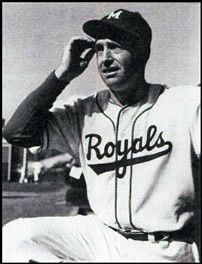
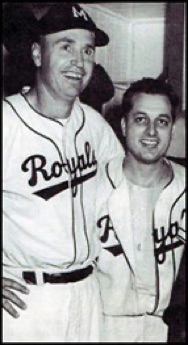
2011
Column Posthumously Honors "Smokey" on His 100th Birthday
The following column, written by Howard Cole, and the photo of Walter "Smokey" Alston and Sandy Koufax, appeared in the Orange County Register.... on December 1, 2011.
Source: Orange County Register; see http://www.baseballsavvy.com/ob_WalterAlston.html
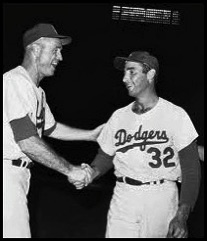
"Walter Alston would be 100 today
On the 100th anniversary of his birth, today we pay homage to the great Walter Alston, arguably the best manager in Dodgers history, and unquestionably the most accomplished.
Though compared to the other major sports, baseball allows for the longest of memories, for some reason, when it comes to Smokey, there’s a rather unfortunate lack of appreciation. Well, no longer. Not if I have anything to say about it. And I do.
For a franchise that dates to 1884, that required nine name changes before finally settling on “Dodgers,” and that endured 71 championship-less seasons before a certain young man from Darrtown, Ohio came along, October disappointment was simply a part of life.
The “lost-the-last-game-of-the-season” line is an expression for today; a good thing too, because 71 is a lot of “lost-the-last-game-of-the-seasons.”
The Brooklyn Robins won National League pennants in 1916 and 1920, losing in the World Series to the Boston Red Sox and Cleveland Indians, respectively. After a 20-year stretch without a league flag (sound familiar?), the Brooklyn Dodgers won the 1941 pennant, only to lose to the Yankees, four games to one.
Another Dodger pennant in 1947, followed by another defeat at the hands of the Yanks in the Series, this time in seven games. Then a five-game Fall Classic loss to New York in ’49, a full-seven defeat in ’52 and a five-game loss in ’53. Each to the New York Yankees.
That’s the Yankees over the Dodgers in the World Series four times in seven years, if you’re scoring. Alston replaces Charlie Dressen in 1954, and bam, the very next year the Dodgers are champions of the world. Coincidence? I think not.
From there, we’re talking another NL crown in 1956, World Series victories in 1959, 1963 and 1965, and two more pennants, in 1966 and 1974. That’s seven pennants – good for fifth place in baseball history, behind Casey Stengel, John McGraw, Joe McCarthy and Connie Mack – and four world championships, of which only McCarthy, Stengel and Mack have more.
Alston won 2040 games as the Dodger skipper, which puts him in tenth place on the all-time list. For easy comparison, Tommy Lasorda won 1599, with of course, half as many rings. Earl Weaver won 1480, Miller Huggins 1413, and Whitey Herzog, who just went into the Hall of Fame last year, 1281. Also for comparison, Tony LaRussa stands in third place with 2728 wins, behind only McGraw’s 2763, and Mack, with his little 3731.
Winning percentage?
For example, try...
Lou Pinella - .517, Dick Williams - .520, Tommy Lasorda - .526, Tony LaRussa - .536, Joe Torre - .538, Sparky Anderson - .545, Bobby Cox - .556.
Walter Alston - .558. - ...with a lifetime mark of 2040-1613.
Walter Alston, 23 years at the helm in Brooklyn and Los Angeles, on 23 one-year contracts.
Seven National League pennants and four World Series triumphs for the Dodgers.
Forgotten by some, perhaps, but proudly celebrated here, on his 100th birthday.
Thanks for the memories, Smokey."
2012
April 19
" 'Cradle of coaches’ goes beyond football - Food for Thought
Ewbank, Parseghian, Schembechler, Brown.
These names are the cornerstones of Miami University’s “Cradle of Coaches.” However, there is one name that belongs with the others most Miamians may not recognize as his accomplishments came not in football, but in baseball.
This man is a four-time World Series champion, his number has been retired by the Los Angeles Dodgers, he won the Dodgers’ first MLB Championship and he is ninth on the all-time wins list for MLB managers. The man is Walter “Smokey” Alston.
Alston is a member of the Baseball Hall of Fame as a manager for the Dodgers organization. He managed the Dodgers in Brooklyn and Los Angeles, coaching some of the greatest players to play the game including Jackie Robinson, Duke Snider, Sandy Koufax, Don Drysdale and many others. All this after he had only one major league at-bat in which he struck out on three pitches.
Alston graduated from Miami in 1935 as a three-time letter winner in basketball and baseball. It was during his time as a Redskin that Alston earned his nickname of “Smokey” for how hard he could throw a baseball. He was elected as a charter member of the Miami University Athletic Hall of Fame in 1969 for his success as a student-athlete and later as a professional manager.
Following graduation, the St. Louis Cardinals drafted Smokey as a first baseman. The scouting report on Alston was he had a sweet lefty swing and was a pure long ball hitter, in addition to dominating the lower leagues of the minors. His one and only major league appearance was in 1936, as his skills seemed to be best suited for the minor leagues.
The rest of his career he bounced around as a player before becoming a player-manager for a team in the New England League in 1946. Following his stint in New England he became a full-time manager, moving from St. Paul to Montreal to manage one of the Brooklyn Dodgers top farm teams.
Alston was hired to be the manager of the Brooklyn Dodgers in 1954. However, when he came into the Dodgers organization the players gave him little respect. He was able to win over the approval of the locker room following an early confrontation with Jackie Robinson, after which the team saw him as the boss and a fair disciplinarian.
Alston, after all, had to deal with managing a variety of stars, including baseball’s first African-American player, but was able to keep his locker room together and was even known as “The Quiet Man” for his mellow personality.
He won his first World Series in 1955, beating the heavily favored New York Yankees in a classic seven game series (the only championship in the team’s 68 years in Brooklyn). The Dodgers moved from Brooklyn to Los Angeles in 1958 and with Alston at the helm, the Dodgers won four National League pennants and three World Series (1959, 1963, 1965).
He finished his career with 2,040 wins, spanning a 23-year period, and during this time Alston received 23 consecutive one-year contracts.
Smokey retired from the Dodgers in 1976 and returned to Oxford. He died in McCullough-Hyde Memorial Hospital Oct. 1, 1984, 10 months after his induction into the Baseball Hall of Fame.
The fact he was a baseball manager should not diminish his accomplishments and he should be remembered as one of the greatest coaches to walk Miami’s halls.
So the next time you’re talking about the Cradle of Coaches, chalk one up for Smokey."

MORE RECOGNITION FOR "SMOKEY"
...THIS FROM THE MIAMI UNIVERSITY STUDENT NEWSPAPER
The following article, written by Miami student, Chris Hopkins, appeared in the April 19, 2012 edition of The Miami Student, which is the student newspaper at Miami University (Oxford, Ohio).
2012
Late April
MORE RECOGNITION...
...THIS FROM THE MIAMI UNIVERSITY ATHLETIC DEPARTMENT
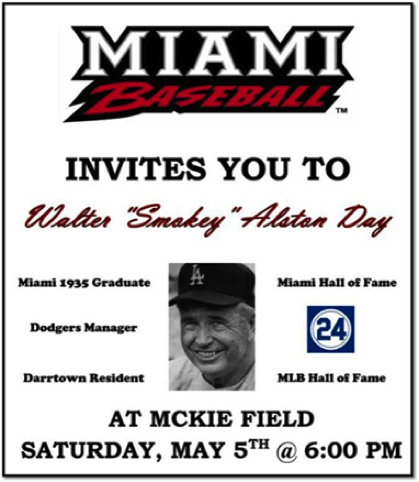
RIGHT:
Miami University provided this flyer, which Darrtown native Sandy Ward Jolivette hand delivered to Darrtown businesses and residents.
This publicity effort within the Darrtown community was accomplished within a seven-day period and a big "THANK YOU" is extended to Sandy!
Walter "Smokey" Alston Day
at McKie Field
Miami University
2012
May 4
MORE RECOGNITION...
...THIS FROM THE DAYTON (OHIO) DAILY NEWS
Famed columnist and sports writer, Tom Archdeacon crafted a story that appeared in the May 5, 2012 Dayton Daily News and its affiliates. Archdeacon's column is reproduced below.

"Miami to celebrate Dodgers’ baseball legend
By Tom Archdeacon, Staff Writer Updated 11:01 PM Friday, May 4, 2012
"DARRTOWN — Thanks to Walter “Smokey” Alston, I was taken on one heck of a ride the other day, although I have to admit it was not as breathtaking as that one he gave Tommy Lasorda out there on Scott Road many years ago.
Mine was a trip along memory lane and it was a lot slower.
When the late Alston managed the Brooklyn and the Los Angeles Dodgers — which he did for 23 years while winning seven National League pennants, four World Series and six NL Manager of the Year awards before being enshrined in the National Baseball Hall of Fame — his team often had a day off right before it played a series with the Reds in Cincinnati.
Alston would invite his players and coaches up to Darrtown, his small hometown near Oxford in Butler County, and he, his wife Lela, their extended family and the local townsfolk would provide them with some food and fun.
“The women from the Methodist Church would cook and they’d picnic the whole area,” said Ron Wiley, a retired Miami University professor who grew up in Darrtown. “They had a miniature Model T Ford that the players drove around town and we had pony rides and everybody just enjoyed themselves alongside the big-name ballplayers like Koufax and Podres and Newcombe, Roseboro and Campanella.”
Lela was known for her homemade pies and she and Smokey’s daughter Dodie and her husband Harry Ogle cooked, too. And then there were the motorcycle rides.
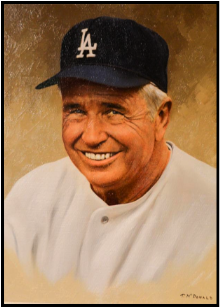
“I remember Dad telling Lasorda he’d give him a ride,” a grinning Harry said of Alston. “Well, Tommy didn’t want to get on, but he finally did and they went out on Scott Road and Dad got up to about 90 miles per hour. Well, it scared the hell out of Tommy and he said, ‘Never again!!!’ ”
That recollection — and so many more — came the other afternoon as 82-year-old Harry, his daughter Kim, Wiley and fellow Darrtown product and Miami alum Fred Lindley, a longtime Centerville schools and University of Dayton educator, gathered around the familiar patch of green where Alston so often showed his prowess.
But it wasn’t a ball diamond. That pilgrimage comes this evening when Miami — Alston’s alma mater, as well — honors the fabled baseball man before and during the RedHawks’ 6 p.m. game with Akron at McKie Field.
A pool shark
To reminisce about Alston, the group gathered around the pool table in the billiard and memorabilia room inside the Cherry Street home he built in the early 1950s and ended up sharing with Harry and Dodie and their two kids, Rob and Kim.
And while Dodie, his wife of 60 years, died last October, Harry still lives there. He told how Alston so loved both the house and his hometown “he couldn’t wait to get back here after the big-league season ended.”
He said Alston hunted here, worked in his carpentry shop, played bridge and especially played pool:
“After dinner we came in here and played three games of pool every night. He’d give me two shots and sometimes I needed three. I remember once he ran 135 balls straight.”
Early in his career — as he played minor-league baseball and one game with the St. Louis Cardinals — Alston also taught at area schools like New Madison in Darke County and Washington Logan High near Indian Lake.
“When he was teaching up there in the early days, every Saturday he’d go to the pool hall in Bellefontaine,” Harry said with a laugh. “Dodie and her mother would go to the movies and about 5 o’clock they’d meet him. All the money he’d won would be stuffed in the front pockets of his (bib) overalls and he’d take them out to dinner with his winnings.”
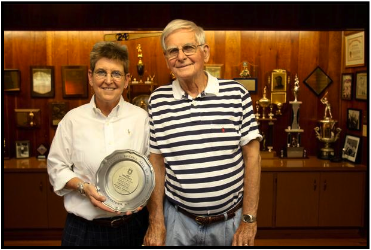
The worlds of billiards and baseball ended up cobbled together in Alston’s woodshop, where he made the wooden benches that now sit alongside his pool table. The legs are made of authentic Dodger baseball bats, including ones that belonged to Jackie Robinson and Johnny Mize.
Every place you looked in that room you saw Alston memories. There were trophies and photos and there was a special diary with Alston’s name printed on the cover.
It was from 1931. The 19-year-old Alston had graduated from Darrtown High School, married Lela and was trying to gather finances so he could return to Miami, from which he had dropped out of for monetary reasons.
Harry opened the booklet and began to read Alston’s handwritten thoughts:
“This book contains the truth and nothing but the truth ... Be it said, no one should read this book unless given permission by the owner, Walter E. Alston ... In this book I intend to write and spell the way I wish and no one shall criticize...”
Loyal to Darrtown
Harry said the Methodist Church gave Alston $50 to help pay his way back to Miami, where he became a basketball player of note, as well.
Alston never forgot the embrace of his hometown and he returned the sentiment in full.
“Smokey never forgot his origin, he never forgot his roots,” said Lindley.
Although he had a teaching job lined up after graduation, Smokey — the nickname came from the speed with which he could throw a baseball signed to play professionally in the Cardinals organization.
After several years in the minors, he was released in 1944 but soon tapped by Branch Rickey to manage teams in the Dodgers farm system. By the early 1950s, he was skippering the Montreal Royals in the International League and in 1954 he was the surprise choice to take over the Brooklyn Dodgers.
Critics thought he was too quiet and unknown, but a year later he won his first World Series.
It was around that same time that Alston was taking part in the annual Christmas parties that Red Huber, owner of the Hitching Post bar and grill, threw for the children of Darrtown.
Wiley and Lindley said Red gave out Florida oranges and candy to the kids and silver dollars to the fathers as Alston handed out autographed baseballs.
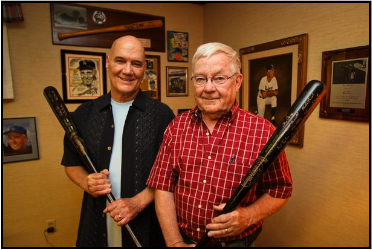
After the ’63 and ’65 Series victories, Lindley organized parades that included an old school bus that was equipped with a loud air horn and decorated by homemade signs praising Alston and the Dodgers.
“The fire truck would lead us, and Constable Kelly was in his patrol car and everybody else joined the caravan in their cars,” he said. “We’d go to Collinsville and up to Oxford and then come back to Darrtown.”
No one got into it any more than young Kim Ogle, Alston’s granddaughter.
“When I was a kid I wanted to be a catcher,” said Kim, who’s now working on her Ph.D. in gerontology at Miami. “I was a little portly, a little chubby and my pediatrician used to call me Lil’ Campy (after Roy Campanella).
Ahead of his time
The Miami University players might not know a lot about Alston — he’s a couple of generations before their time — but they’re still being guided by him, said RedHawks coach Dan Simonds.
“Believe it or not, I’ve got a Walter Alston manual that I’ve had since I was a coach in the (San Diego Padres) minor leagues,” he said of the 1972 book The Complete Baseball Handbook. “He was one of the best men ever in baseball — he was way ahead of his time — and the things he thought and did apply perfectly now.
“His book deals with everything from how to teach and play the game to how to act off the field. I refer to it on a weekly basis.”
The Miami players also are reminded of Alston by a small display of mementoes in the Walter “Smokey” Alston Room at McKie Field.
Although Alston died in 1984, a year after his Cooperstown enshrinement, he is still remembered in various ways today. Darrtown has signs on Route 177 coming into town announcing it as the Home of Walter Smokey Alston.
There is a memorial stone that does the same in a park across from The Hitching Post and there is a wonderful website, www.darrtown.com, that Lindley maintains and keeps chock full of things about Alston, the town and the upcoming 2014 bicentennial.
In July, Alston will be honored at Dodger Stadium and Rob, who lives in Southern California, will throw out the first pitch. Kim did the same last year in Columbus when her grandfather was enshrined in the International League Hall of Fame, and she’ll do the honors tonight at McKie Field.
First, though, Walter Alston will take everybody on one more ride.
It won’t be a sit-back, meandering down memory lane like we had the other day, nor a hang-on-for-dear-life roar down a Butler County road like Lasorda got.
It will be somewhere in between.
Just like they did back in ’63 and ’65, some folks in Darrtown are going to get behind the fire truck and make one more parade to Oxford to celebrate the favorite son who never forgot his home."
2012
May 5
MORE RECOGNITION FOR "SMOKEY"
..."Alston Day" at Miami University and a parade
from Darrtown to Miami's McKie Field in Oxford
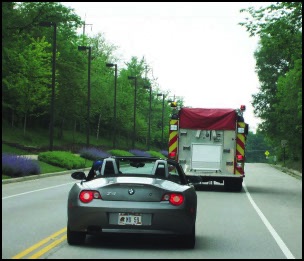
Approximately thirty-five people traveled, in a caravan of 15 cars, from downtown Darrtown to McKie Field, to honor the memory of the Darrtown's Hall of Fame native son and to support KIm Ogle, as she threw out the ceremonial first pitch. Kim's father, Harry Ogle, was at her side, as Kim emulated her grandfather throwing "smoke" to the catcher.
With lights flashing, on the Sheriff's car and Milford Township's fire truck No. 162, the occasional sounding of the fire truck's siren, and horns honking from the individual cars in the caravan, Darrtown and Oxford on-lookers were alerted to the fact that something special was happening!
The caravan was escorted by Butler County Sheriff's deputy, Donald Tolley, a second-cousin of Walter Alston, and Milford Township firemen, Jim Meador and Gary Cole.
Another parade in honor of "Smokey"
All things considered, it turned out to be a pretty good-sized event for the little community of Darrtown. With only one week's notice, Darrtown enthusiasts and Walter Alston fans managed to organize a parade to help commemorate the memory of Walter Alston, as the Athletic Department of Miami University (Ohio) hosted "Alston Day" on May 5th, 2012.
ABOVE: Parade leaders on the Rt. 73 hill into Oxford
Gathering for the 2012 Alston Day Parade!
Some of the parade participants (identified below) gathered at the Hitching Post, in Darrtown, before joining the parade.
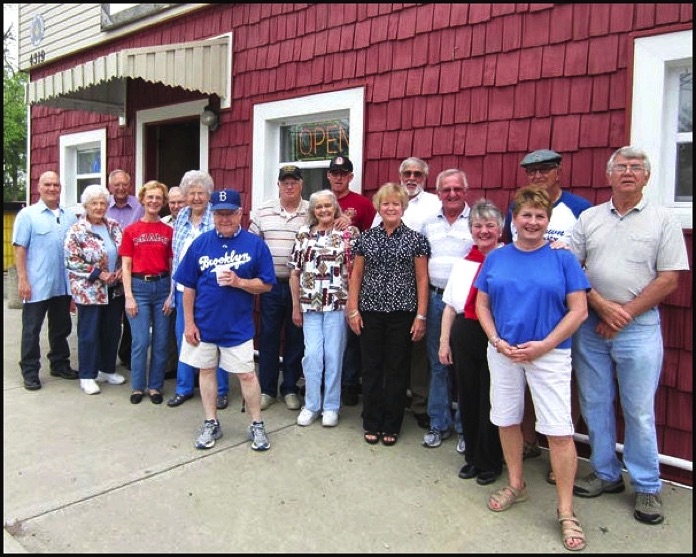
1 - Fred Lindley
2 - Freda Derickson
3 - Gene Derickson
4 - Betty Amrein
5 - Walt Amrein
6 - Marna Evans
7 - Ron Wiley
8 - Russell Collins
9 - Dixie Collins
10 - Paul Gillespie
11 - Betty Daniels
12 - John "Jack" Daniels
13 - Joe Pater
14 - Sandy Ward Jolivette
15 - Kathy Wiley
16 - Ken Russell
17 - Marvin Russell
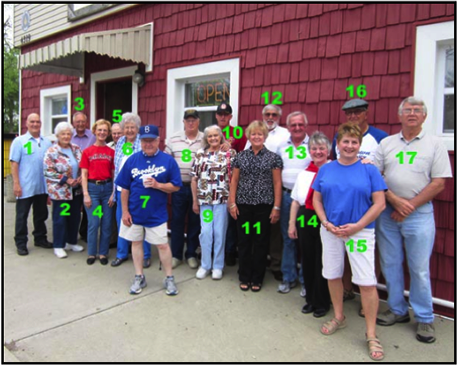
Arrival at Hayden Park!
After posing for the photo that appears at the right, the group walked to the Alston Room to view baseball memorabilia, enjoy some refreshments, and settle in for the game between Miami and Akron on McKie Field.
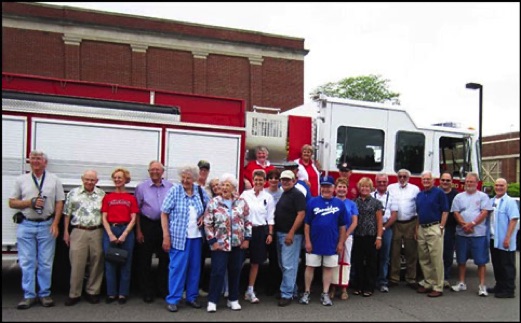
Clockwise order,
beginning at the top left:
The entrance to
Hayden Park and
McKie Field
The sign posted above
the doorway to "Smokey's" Room
Jude Killy,
Associate Athletic Director,
Miami University, with
Sandy Jolivette
of Darrtown
Part of the
Alston exhibit
inside the
Alston room
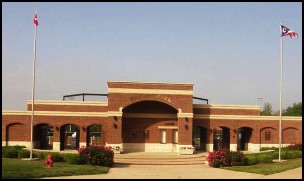

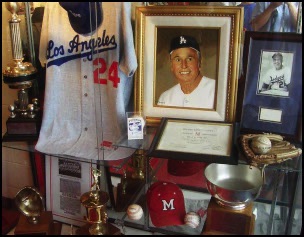
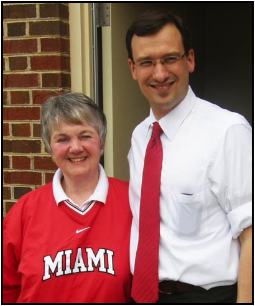
LEFT: Harry Ogle and daughter, Kim Ogle, prepare for the ceremonial "first pitch."
BELOW: Kim delivers a STRIKE!
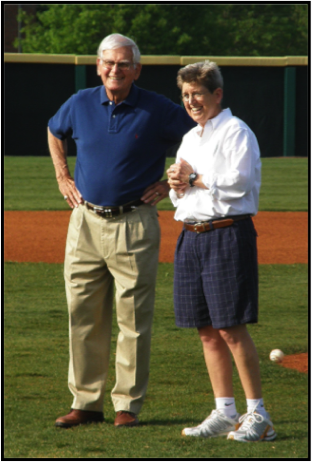
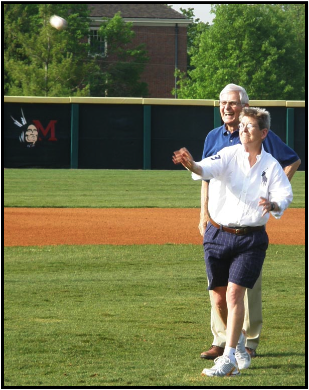
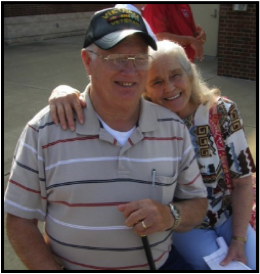
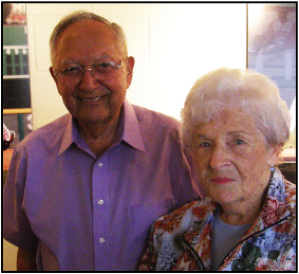
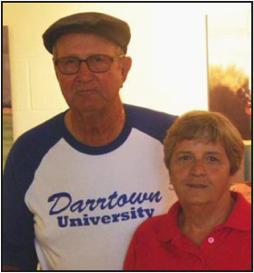
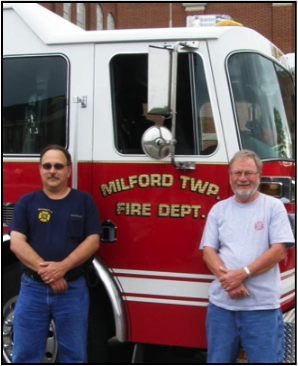
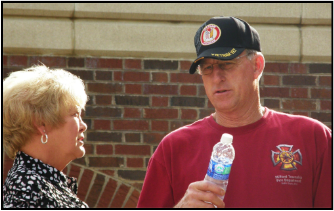

ABOVE: Russell and Dixie Collins
ABOVE: Gene and Freda Derickson
ABOVE: Ken and Caroline Russell
LEFT: Milford Township Firemen
Gary Cole and JIm Meador
RIGHT: Betty Daniels and Paul Gillespie visiting before the game.
RIGHT: Debbie Lindley and her mother, Ocie Kelly near the entrance to the Alston Room.
2014
August
13
MORE RECOGNITION FOR "SMOKEY"
...THIS FROM THE CINCINNATI ENQUIRER
August 13, 2014
2019
August
21
MORE RECOGNITION FOR "SMOKEY"
...THIS FROM THE LADODGERTALK WEBSITE

The following article was posted by "DodgerChatter" on August 21, 2019, at: https://ladodgertalk.com/2019/08/21/walter-who/.
60th ANNIVERSARY OF ALSTON'S MANAGERIAL DEBUT RECOGNIZED
Mike Dyer wrote the following Cincinnati Enquirer article.
These images accompanied the August 13, 2014 Cincinnati Enquirer article.
"When Walter Alston became the Brooklyn manager 60 years ago this season, Darrtown became Dodgertown.
While the Ebbets Field faithful had to wait decades for its first and only World Series title in 1955, the small Butler County town Alston lived in during the offseason helped laud him and celebrated four titles in 10 years between Brooklyn and Los Angeles.
"The Darrtown celebrations after the '63 and '65 World Series were quite something for a small little town," said Kim Ogle, granddaughter of the late Alston.
"After the final out for each series, I remember people shooting off shotguns literally painting the town."
Fireworks were too difficult to obtain, Kim said. Everyone had shotguns in town.
The telephone poles were also painted blue and white noting how the Dodgers were world champions or welcoming home Walter "Smokey" Alston. The phone rang nonstop at the Alston residence on Cherry Street.
A parade with a converted school bus and parties followed. A bonfire across from the Hitching Post in town was also hosted.
Alston, his wife Lela and grandchildren Rob and Kim rode in a convertible behind a band one year. Those were the days in Darrtown.
"The celebrations," Rob Ogle said, "were a real slice of Americana."
Sixty years after Alston's Major League managerial debut, Harry Ogle – Alston's son-in-law – enjoys recalling how the same Cherry Street house built in 1952 hosted several Dodger greats over the years.
Through one-year contracts, Alston managed the Dodgers for 23 seasons (1954-1976).
When the Dodgers had an off day in Cincinnati, Rob remembers his grandparents would invite members of the organization for dinner. (Rob said he remembers the dinners occurred after the team moved to Los Angeles in 1958).
Sandy Koufax, Don Drysdale, Don Sutton and Maury Wills were among some of the players who went to dinner in Darrtown over the years. Even the traveling media was invited; and of course so was Vin Scully, who last week announced he will return for his 66th consecutive season in the radio booth in 2015.
Steaks, baked potatoes and salad were recalled as on the menu items for the ballplayers the house, Harry said.
"It was a chance to relax in a country setting and get away from the day to day life on the road," said Rob, who is a marketing consultant in Dallas.
The dining area where the ballplayers sat is still there. Ogle, 84, lives in the house where he and his late wife Dodie used to help the family cook the meals. Dodie was the daughter of Walter and his late wife Lela.
Darrtown never forgot Alston, a native of nearby Venice, Ohio. The Walter "Smokey" Alston Highway sign is visible entering town from Route 177. (He was nicknamed for how fast he threw as a youth).
There is also a diamond-shaped memorial in town with career highlights listed beneath a photo.
Having their grandfather back in Darrtown each offseason for his 23-year Major League managerial career was like living in their own City of Angels for Kim and Rob.
Activities included horseback riding, ice skating, sled riding, pickup baseball games, skeet shooting, bridge, billiards and good old practical jokes. Everything revolved around family for Alston.
Rob said his grandfather was very cordial to those around him and he could often be found at a lumber shop in Hamilton or the hardware shop in nearby Oxford wearing his bib overalls into town. In retirement he bought a pair of motorcycles and thoroughly enjoyed life.
Alston's handiwork is all around the house, including the brickwork above the fireplace and furniture in the billiards room. Several trophies, plaques and photographs adorn the walls of the billiards room where he was a pool shark. He was also known as a superb bridge player.
"He was truly larger than life for us as kids," said Kim, who is working on her Ph.D. in gerontology at nearby Miami University and is the funeral director at Ogle & Paul R. Young Funeral Homes.
Kim and Rob have fond memories of sharing experiences some of the game's greatest stars of the 1950s and 1960s in Darrtown and in Los Angeles."I was to some extent awestruck but you learn from an early age…these are regular guys," Kim said.
Starting at nine years old, Rob started to travel with his grandfather and would sit in the dugout and take batting practice; he traveled by himself for his first trip to Milwaukee.
Kim remembered the family trips to Los Angeles at either the Coliseum or Dodger Stadium each year and recalled sharing time on the plane with Drysdale and Koufax. Rob received his first pair of baseball spikes in the 1960s from Drysdale.
Rob filmed a commercial with Maury Wills in 1964 for Delco batteries in Los Angeles – he received a 8 check from the Dodgers base-stealing great.
The late Hall of Fame catcher Roy Campanella gave Kim some catcher's equipment as a youngster that she still has in her possession. As a child, Kim was referred to as "Little Campy" by her pediatrician and her grandfather often said she worried more about the Dodgers than Alston did.
Although Alston, who played baseball and basketball at Miami University, worked in two major cities as a manager, he always looked forward to returning to Darrtown and didn't crave the Hollywood spotlight.
"He hated going out to dinner probably because he ate so many meals on the road," Rob said. "Remember he basically had a night job the majority of the time. By the time he got out of the ballpark and got home it would be around midnight."
The Dodgers won seven National League pennants and four World Series titles during his tenure. He retired in 1976. He appeared in one Major League game as a player in 1936 with the Cardinals.
Alston won 2,040 games during his career and was elected to the Baseball Hall of Fame 1983 by the Veterans Committee. Because of complications from a heart attack, he couldn't attend the induction ceremony that summer.
Alston told Rob to give the acceptance speech in Cooperstown.
Rob said he tried to give a speech his grandfather would want – thanking the O'Malley family along with the Dodger greats over the 23 years. He also spoke about his grandfather's ability to manage a club especially during the advent of free agency.
"It was truly, truly the biggest honor I ever had," said Rob, who was the assistant general manager for the Dodgers' Triple-A affiliate Albuquerque from 1976-80.
Time stands still in the billiards room where Alston often exhibited his pool skills for at least an hour after dinner. He also did paperwork at the desk on the left side of the room.
A clock on the right side of the room remains frozen at four o'clock – the time he died on Oct. 1, 1984 in Oxford.
Alston's memory radiates in not only the baseball treasures and mementos, but how he embraced being a family person at home every autumn.
"To me, (the pool room is) my grandfather's legacy," Kim said.
"I come in here and sometimes –because I grew up with him as my grandfather – it didn't always hit me who he was. And I come in here sometimes and think 'wow this is impressive' – even now."
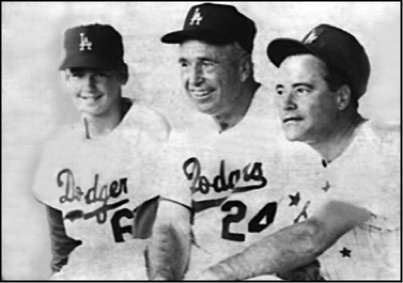
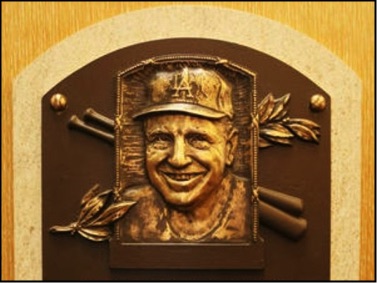
"Rob Ogle, Dodgers manager Walter Alston and actor Jack Lemmon at Dodger Stadium. Rob is the grandson of Alston."
Walter Alston Hall of Fame plaque
Cooperstown, New York
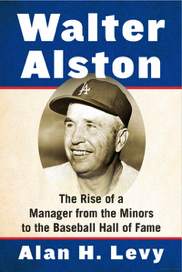
RIGHT: This biography of Smokey's life, titled "Walter Alston - The Rise of a Manager from the Minors to the Baseball Hall of Fame" was written by Alan H. Levy, a history professor at Slippery Rock University (Slippery Rock, Pennsylvania) and published February 2021.
Read about the book and the author at: Slippery Rock University
Levy's book can be purchased on Amazon and other online booksellers.
The text is available for (free) online reading at: Levy's book online.
Discovered in Feb. 2022
WALTER ALSTON ELECTED TO BASEBALL'S HALL OF FAME
Walter "Smokey" Alston was inducted into the Baseball Hall of Fame at Cooperstown, New York on July 31, 1983.
Due to health issues, Walter was unable to attend the HOF induction. His grandson, Rob Ogle, represented Walter at Cooperstown. Rob's comments appear in the video link below.
Discovered in Dec. 2022
A news column about Walter Alston's selection for baseball's Hall of Fame surfaced in late 2022. Written by famed sports writer, Jim Murray, the article endorses Walter's selection ... and includes several whimisical descriptions of Walter's home town ... Darrtown, Ohio.
Click the following links to read Mr. Murray's column.
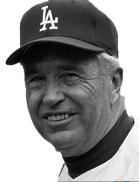

Jim Murray and Walter Alston
Discovered in Feb. 2024
A CORRECTION - Much has been written about the life and career of Walter Smokey" Alston. Occasionally, even the national sports writers get it wrong. Such was the case when Milton Richman wrote that Walter Alston taught school ... at Darrtown.
Click the links at the right to see Mr. Richman's mistake and the corrected information.
